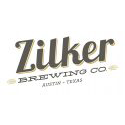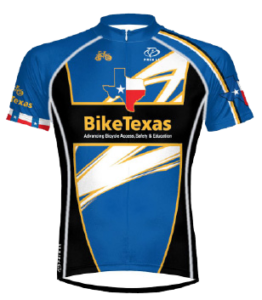When it comes to the Texas Legislature, BikeTexas has one job–represent the interests and concerns of the thousands of Texans, of all ages and all abilities, who want safe places to bike and walk. In practice, this plays out in any number of ways each session, including:
- recruiting legislators to champion bills that will benefit bicyclists and pedestrians;
- answering questions from legislators who may have never heard from a bicyclist before;
- facilitating conversations between biking and walking constituents and their legislators’ offices; or
- reaching out to legislators when their bills may cause hardships for Texans who bike or walk.
Our concerns with HB 715
After over 30 years’ experience, BikeTexas has found it to be crucial at the beginning of each session to examine the specific language in any bill pertaining to biking or walking, to look for any unintended consequences or potential outcomes that might be inconsistent with what is stated in the bill or the bill analysis.
HB 715 addresses some language in Texas Parks and Wildlife Department’s (TPWD) policies that could be interpreted as restricting electric bicycle (ebike) use on state parks roads or trails. TPWD themselves have taken steps to address this language, although they have not yet made the change official. We have not heard of any ebike owners being asked to either refrain from riding or to leave a state park.
HB 715 was intended to correct this language at the legislative level and codify ebike access to state parks. Unfortunately, the bill would also add new and onerous registration requirements for Class 2 ebikes, failed to mention Class 3 ebikes at all, and included a new provision for state parks staff to restrict any ebike usage within a park.
We support all kinds of bicycling
BikeTexas is passionate about all forms of bicycling, from kids trying out their first balance bike to senior couples still riding their tandems together. We believe that Texans of all ages and all abilities should be able to safely bike, no matter where in the state they live. That’s why we supported a law in 2021 that clarified that bicycles adapted for use by Texans with disabilities are classified as bicycles in state law.
We’ve heard from many Texans with disabilities that biking is often easier for them than walking and adds a layer of mobility and physical activity to their daily lives, and they want to keep doing it for as long as they can. For BikeTexas, that’s a rallying call to be sure that biking is safe and accessible for all Texans and their bicycles or tricycles of all shapes.
It was also with people of all ages and all abilities in mind that BikeTexas urged the 2001 legislature to lead the US with the nation’s first ebike law–a law that many states and even the federal government drew from when writing their own initial ebike policies. In 2019, we knew that while Texas’ ebike law was a good one for 2001, it was out of date with the advancements in technology, current best practices, and the three-class regulatory system adopted by the bicycle industry, multiple states, and other organizations around the country, like Rails to Trails Conservancy.
The 2019 legislature passed the updated ebike legislation, defining the classes of ebikes, clarifying that any bikes in those classes fall under the “bicycle” definition in state law, and assuring bicycle retailers, local officials, and Texans considering an ebike purchase that ebikes are legally rideable all over Texas.
People choose ebikes for all kinds of reasons: maybe they need a boost over a hill, or maybe they’re getting older and find they’re pedaling more slowly now. Maybe their adaptive bicycle is even more fun with a pedal assist, or they want to arrive at work a little less sweaty in the summer. Our own fleet of ebikes is in use nearly every day by city officials from around the state checking out Austin’s bike facilities, tourists who want to see Austin by bike and call on our tour guides for help, or locals looking for a fun evening. Whatever the reason, BikeTexas supports it–and so does Texas state law.
Actions on HB 715
So we were worried about HB 715’s possibility for unintended consequences. Due to the nature of legislative proceedings, since the bill was already written and filed, we could only respond to it in limited ways, such as offering substitute language; registering as for, neutral, or against; and getting the word out about the bill and asking bicyclists in Texas to share their thoughts. BikeTexas was founded by a former legislator and we have worked constructively with the legislature and members of both parties for over 30 years, so this is a process we have been through many times before.

Therefore, our first choice was working directly with the bill author. We offered substitute language twice for the parts of the bill we found troubling–when the bill was first introduced, and again after the initial hearing in the House committee. At the hearing, we spoke about our problems with the bill but didn’t oppose it; we remained neutral at the request of another member of the House who thought we would have more time to address our concerns. When time ran out and the bill passed the House, it went to the Senate as-is.
Our substitute language would do the following for HB 715:
- add Class 3 ebikes into the language wherever Class 1 and Class 2 were mentioned;
- clarify that ebikes are also prohibited from areas of state parks where other bicycles are prohibited;
- explicitly confirm that TPWD may establish and enforce speed limits for bicycles on all state park trails and roadways;
- remove the permitting requirement for Class 2 ebikes;
- state that “out of class electric vehicles” (that is, any electric vehicle with pedals that does not meet the criteria for a Class 1, 2, or 3 ebike), are prohibited from state parks. These are generally vehicles that look like bicycles but have some modifications that put them outside the legal definition of ebikes.
Texans offer their concerns
Between the referral of HB 715 to the Senate Committee on Water, Agriculture, and Rural Affairs, and the lege session getting down to the wire, many Texans who ride bikes decided it was time to weigh in with their own concerns about the bill. Ultimately, the bill was pulled from consideration at a Senate committee hearing due to witness opposition. The bill is likely to remain in committee in the final days of the legislative session, so no official testimony has yet been needed. Below are the thoughts of some of the many people concerned by HB 715.
Woody Smith, Bike Mart
We own 7 bicycle retail stores in the DFW area. I am concerned about HB 715 for these reasons:
1. eBike sales will suffer if customers do not know which parks they are allowed in.
2. HB 715 would disproportionately affect older customers, including Winter Texans.
3. If Texas State Parks become unpredictable for ebikes, it could depress tourism from within the state and from out of state.
4. Bicycle Sales and Accessories make up 20% of the Sporting Goods Sales Tax, which funds the Texas Parks and Wildlife Department. Since ebikes are a growing share of that revenue, it is not fair to ban them from the state parks.
5. eBikes are an important and growing sales segment for my company.

Audrey & Mark Sze-To, Electric Avenue, Dallas, Austin, & Houston
I am against HB 715 because it prohibits Class 3 ebikes from state parks by omission. HB 715 may have been written with good intentions, but it could harm the growth of the ebike market and ebike shops, as well as other retailers of recreational & fitness products like ours.
We supported an ebike bill in 2019 passed by this legislature. It defined the 3 classes of low-speed electric bikes. It is consistent with statutes in many states. It made it predictable for manufacturers, distributors, and retailers regarding what an ebike is, and also helps facilitate interstate recreational tourism.
We thought that 2019 bill included state parks. We never heard that Texas State Parks prohibited ebikes until this bill was introduced.
For those of us without a first-hand familiarity with ebikes: Class 3 ebikes are not mopeds. To add to the confusion, some channels sell high-speed two wheelers with pedals and/or throttles that do not fit into the 3 class definitions for ebikes.
If the spirit of this bill is to prohibit or restrict those kinds of products–products which I do not advocate–then please be clear that Class 3 ebikes are not those.
Before next session, let’s work together to manage the out-of-category light electric vehicles in state parks.
Please vote no on 715 and don’t risk damaging small business, ebike shops, bike shops, and recreational tourism providers.

Jeff Pryer, Pedego Electric Bikes, Cedar Park
I oppose HB 715. The bill seems to be addressing a non-existent problem. We have never heard of an electric bike ban in Texas state parks. All classes of ebikes should be encouraged, not discouraged by law or bureaucracy.
The Texas Department of Transportation recently secured $17 million of federal funding for the 120 mile Northeast Texas Trail, referred to as the NETT. There have been discussions about making it a linear state park like the Katy Trail in Missouri. This bill would not allow a Class 3 ebike on the NETT.
eBikes are low speed. Class 3 ebikes CAN go 28 MPH, but typically don’t. A car CAN travel at 100 mph but it usually doesn’t. We allow them on neighborhood streets at appropriate speeds.
Serious bicycle racers can average over 30 mph in a race. We don’t prohibit racing bikes from trails. Please don’t blame class 3 ebikes because some people ride some bikes too fast or some people ride electric mopeds that do not meet the definitions of ebikes.
If it has a throttle, and goes faster than 20mph, it is not an ebike. If it can go faster than 28 mph, it is not an ebike. The bike industry has coined the term “Out of Class Electric Vehicle” for those two wheelers that do not fit the 3-class definition. I am not advocating for OCEVs on park trails.
We should not prohibit Class 3 electric bikes or make an onerous registration requirement for Class 2 electric bikes in state parks.

Terry McCarthy
I am a retired airline Captain and retired Air Force fighter pilot. For the past five years, I’ve been a Coach for the University of Texas Women’s Lacrosse team. Unfortunately, I also have the good fortune to be a 67-year-old heart attack survivor. I have concerns about the current language in HR 715 concerning ebike use in Texas State Parks.
I personally use an ebike to commute 15 miles to work, to do chores on my electric grocery-getter-cargo-bike, and especially to experience the joy of being outdoors, riding, and sight-seeing on trails at every opportunity.
At first glance, the language appears to allow electric bicycles on the trails in our state parks. In my opinion, that’s a good thing!
But a deeper dive into the bill’s language actually appears to give park officials the possibility to regulate and restrict ebikes from state park trails that already allow conventional bicycles.
My hope is that you will resolve and improve the language to allow ebikes on any State Park trail or road that allows conventional bicycle traffic.
I completely agree with the necessity to protect public safety, the park infrastructure, and especially fish and wildlife resources and habitat.
Riding a bicycle is a healthy, wonderful and truly spectacular ways to experience our parks.
But the possibility of unnecessarily segregating ebikes, regardless of class, from conventional bicycles, for stricter regulation and restriction opens the door to isolating those of us that need the extra bit of energy assist–older, less fit, physically challenged–to enjoy the bicycle trails in our Texas State Parks.

Lori Merlino
I am AGAINST HB 715. I am for safety and protecting our state park trails.
This bill would prohibit Class 3 ebikes from TX state parks. I have a Class 3 ebike.
I retired after a career as a Manager at Applied Materials. I also have an RV and I love to camp in state and national parks and ride my ebike on trails.
Class 3 ebikes are not mopeds. They do not have a throttle, they are only pedal assist. Even though it is theoretically possible to go 28 mph on a Class 3 ebike, I never have. I usually ride at 10-12 mph. Regular bikes frequently pass me on the trails.
I have never encountered a ban on ebikes in Texas state parks. If there is a ban, it is not obvious. The store where I bought my ebike was not aware of a ban on ebikes in State parks.
I chose my Class 3 ebike because it was the best ebike in the store and I could afford it. I do not know if I would have bought an ebike if access to trails in state parks was prohibited or unpredictable. What am I supposed to do if HB 715 passed?
I think tourists like myself would go to other parks in other states that welcome ebikes.

Pam Dixon
I am AGAINST HB 715.
I have a top-of-the-line, lightweight, Class 3 ebike.
I am a nurse practitioner. There can be a lot of stress in my work and I value my ebike to ride off the worries of the day. I am very conscious about the importance of physical activity for health.
I have an RV and combined with my ebike, it gives me mobility and fitness. I have ridden in many Texas state parks on my ebike without cause for concern from parks staff. I ride in municipal parks all over the state. Why should should each state parks be able to make up it own rules about ebikes on trails when every single municipal park in the state allows it?
I have seen speed limits on city park trails that apply to ebikes and regular bikes. Why not manage ebikes just like regular bikes? I don’t bike in Lost Maples State Park because no bikes are allowed. I think it is the only state park that doesn’t allow bicycles because of environmental reasons.
Some bicyclists ride too fast, just like some motorists drive too fast. Yet we don’t ban cars from city streets just because they are capable of going over 100 mph. We post speed limits!
Why not just post speed limits that apply to all users on state park trails, just like city parks do?

Next steps
We plan to continue engaging in a dialogue with our friends at TPWD about how we can work with them to best accommodate e-bikes safely in state parks with minimal impact.
A special legislative session is always a possibility, and we’ll be keeping an eye out for any active transportation bills that come up. We look forward to many productive lege sessions in the future as we meet with legislators from both parties to craft bills that are mutually agreeable for all.










